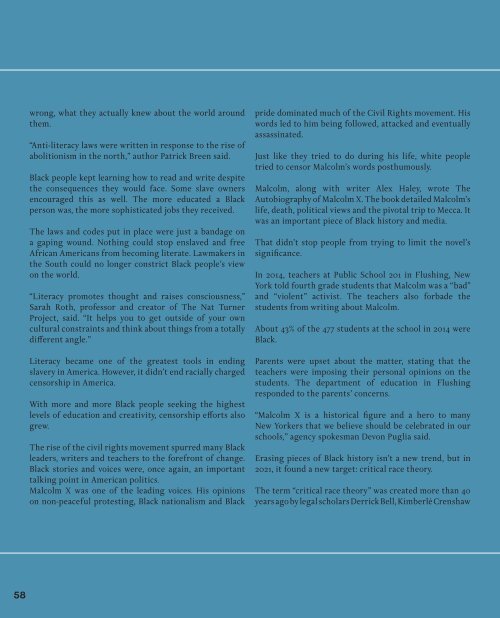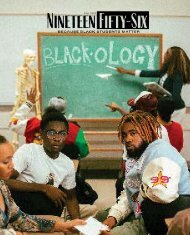Nineteen Fifty-Six Vol. 2 No. 5
This is the 2022 print edition of Nineteen Fifty-Six magazine. The theme "Movin' On Up" is inspired by the Black Panther Party.
This is the 2022 print edition of Nineteen Fifty-Six magazine. The theme "Movin' On Up" is inspired by the Black Panther Party.
You also want an ePaper? Increase the reach of your titles
YUMPU automatically turns print PDFs into web optimized ePapers that Google loves.
wrong, what they actually knew about the world around<br />
them.<br />
“Anti-literacy laws were written in response to the rise of<br />
abolitionism in the north,” author Patrick Breen said.<br />
Black people kept learning how to read and write despite<br />
the consequences they would face. Some slave owners<br />
encouraged this as well. The more educated a Black<br />
person was, the more sophisticated jobs they received.<br />
The laws and codes put in place were just a bandage on<br />
a gaping wound. <strong>No</strong>thing could stop enslaved and free<br />
African Americans from becoming literate. Lawmakers in<br />
the South could no longer constrict Black people’s view<br />
on the world.<br />
“Literacy promotes thought and raises consciousness,”<br />
Sarah Roth, professor and creator of The Nat Turner<br />
Project, said. “It helps you to get outside of your own<br />
cultural constraints and think about things from a totally<br />
different angle.”<br />
Literacy became one of the greatest tools in ending<br />
slavery in America. However, it didn’t end racially charged<br />
censorship in America.<br />
With more and more Black people seeking the highest<br />
levels of education and creativity, censorship efforts also<br />
grew.<br />
The rise of the civil rights movement spurred many Black<br />
leaders, writers and teachers to the forefront of change.<br />
Black stories and voices were, once again, an important<br />
talking point in American politics.<br />
Malcolm X was one of the leading voices. His opinions<br />
on non-peaceful protesting, Black nationalism and Black<br />
pride dominated much of the Civil Rights movement. His<br />
words led to him being followed, attacked and eventually<br />
assassinated.<br />
Just like they tried to do during his life, white people<br />
tried to censor Malcolm’s words posthumously.<br />
Malcolm, along with writer Alex Haley, wrote The<br />
Autobiography of Malcolm X. The book detailed Malcolm’s<br />
life, death, political views and the pivotal trip to Mecca. It<br />
was an important piece of Black history and media.<br />
That didn’t stop people from trying to limit the novel’s<br />
significance.<br />
In 2014, teachers at Public School 201 in Flushing, New<br />
York told fourth grade students that Malcolm was a “bad”<br />
and “violent” activist. The teachers also forbade the<br />
students from writing about Malcolm.<br />
About 43% of the 477 students at the school in 2014 were<br />
Black.<br />
Parents were upset about the matter, stating that the<br />
teachers were imposing their personal opinions on the<br />
students. The department of education in Flushing<br />
responded to the parents’ concerns.<br />
“Malcolm X is a historical figure and a hero to many<br />
New Yorkers that we believe should be celebrated in our<br />
schools,” agency spokesman Devon Puglia said.<br />
Erasing pieces of Black history isn’t a new trend, but in<br />
2021, it found a new target: critical race theory.<br />
The term “critical race theory” was created more than 40<br />
years ago by legal scholars Derrick Bell, Kimberlé Crenshaw<br />
58


















